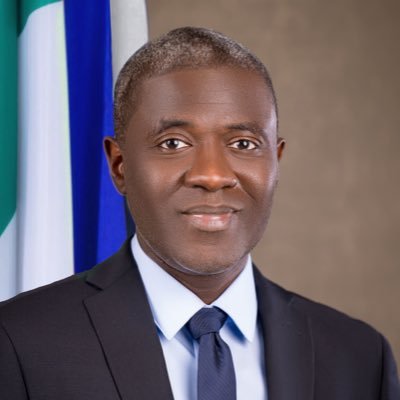Telecoms
How NCC is Tackling Data Depletions, Related Matters
Published
1 year agoon

Globally, DataReportal notes there are now over five billion internet users, with Nigeria alone accounting for 132 million connections.
Nigerians spend an average of 4 hours and 20 minutes on social media daily, far above the global average, underscoring how deeply embedded digital interaction is in our lives.
Read Also:
In 2024, Nigeria’s daily data usage averaged 336 gigabytes per second, marking a 39% increase from the previous year—a clear indication of the data-driven lifestyle many Nigerians lead.
Despite this, many consumers feel their data depletes faster than expected, echoing a sentiment I hear often.
Nigeria isn’t alone in this; other countries, like Eswatini, are also working to address similar consumer concerns about data usage.
Dr. Aminu Maida, the executive vice chairman and chief executive officer of the Nigerian Communications Commission (NCC) made the above statements while addressing telecom stakeholders who gathered at the 93rd Telecoms Consumer Parliament (TCP) held in Abuja, last week.
Continuing, the EVC said:
“Earlier this year, NCC analyzed consumer complaints, revealing data depletion and billing issues as top concerns. In response, we directed Mobile Network Operators and ISPs to conduct audits of their billing systems, which reported no major issues. However, perceptions persist due to two main factors:
(1) the impact of high-resolution devices and improved technologies on data use and
(2) the complexity of operator tariffs.
“With the advent of 4G and 5G, as well as devices with ultra-high-definition screens, data consumption has naturally increased. For example, while viewing a photo on Instagram might have required only 100 kilobytes of data five years ago, today, with advanced camera resolutions, a photo can consume between two to four megabytes when opened on Instagram.”
According to Tech Advisor, an online resource that offers tech reviews, spending an hour on Instagram can set you off an average of 600 Megabytes of your data, while streaming platforms like YouTube would set you off by about 3.5 to 5.4 Gigabytes per hour.
To this end, Maida said,
“Improved technologies go beyond their purchase cost to our pockets, they also come at a cost to data. Because they have better screen resolutions, they consume higher quality media that consumes more data.
“This is the same for our increasing digital habits: according to DataReportal, the world’s internet users are spending less time watching television; the average daily television viewing has fallen by over 8% in the past one year.
“These viewers are now spending more time on their telephones, tablets, and smart TVs streaming programmes that they would previously have watched on broadcast television”.
Recognizing these challenges, he said the Commission, in collaboration with major operators, launched a Joint Industry Campaign on Consumer Awareness on Smarter Data Usage.
This media campaign, spanning radio, television, newspapers, and SMS, aims to educate consumers on effective data management.
“I am sure many of you have encountered jingles or graphics offering tips for managing data. Our message emphasizes empowering consumers with the knowledge to optimize their data usage. For example, many smartphone users may not know that their devices can track data usage and allow them to set limits on the amount of data they want to use”, the EVC said. He also asked the audience: “How many of us are aware of this feature?”
“Smartphones, even when idle, often run background applications like automatic updates and location services, which consume data. Additionally, high-definition streaming services like Netflix consume substantial data— about three gigabytes per hour in high definition, or seven gigabytes in ultra-high definition.
“The Commission believes that an informed consumer is a better-equipped consumer, leading to a clearer understanding of data consumption and reducing misconceptions about data depletion.
“In addition, to address tariff complexity, NCC issued Guidance on Tariff Simplification, requiring operators to provide clear, accessible information on data plans and pricing. This transparency will empower consumers to make better-informed decisions about their data usage and billing”.
He assured that in the coming months, operators will implement this guidance, presenting consumers with tables detailing their tariff plans, billing rates on each plan, and all terms and conditions related to the tariff plans they are on.
He stressed that at the heart of the Commission’s Strategic Vision is the commitment to meet the expectations of its stakeholders: the Consumers, the Industry/Licensees, and the Government.
Source: Techeconomy
Share this:
- Click to share on X (Opens in new window) X
- Click to share on Facebook (Opens in new window) Facebook
- Click to share on WhatsApp (Opens in new window) WhatsApp
- Click to share on Pocket (Opens in new window) Pocket
- Click to share on Telegram (Opens in new window) Telegram
- Click to email a link to a friend (Opens in new window) Email
- Click to share on LinkedIn (Opens in new window) LinkedIn
You may like


NCC Committed to Regional Digital Integration – Maida


Telcos to Pump Fresh N1.4 Trillion on Network Expansion – NCC


NCC to Rollout Satellite-to-Phone Technology for 23.3m Nigerians


NCC, CBN Introduce 30-Second Refund Rule for Failed Airtime and Data Purchases


NCC Seeks Stakeholder Input on Draft Five-year Spectrum Roadmap, 60 ghz Guidelines


Nigeria’s Active Telecom Subscribers Hit 173.5m as Broadband Penetration Nears 50%












